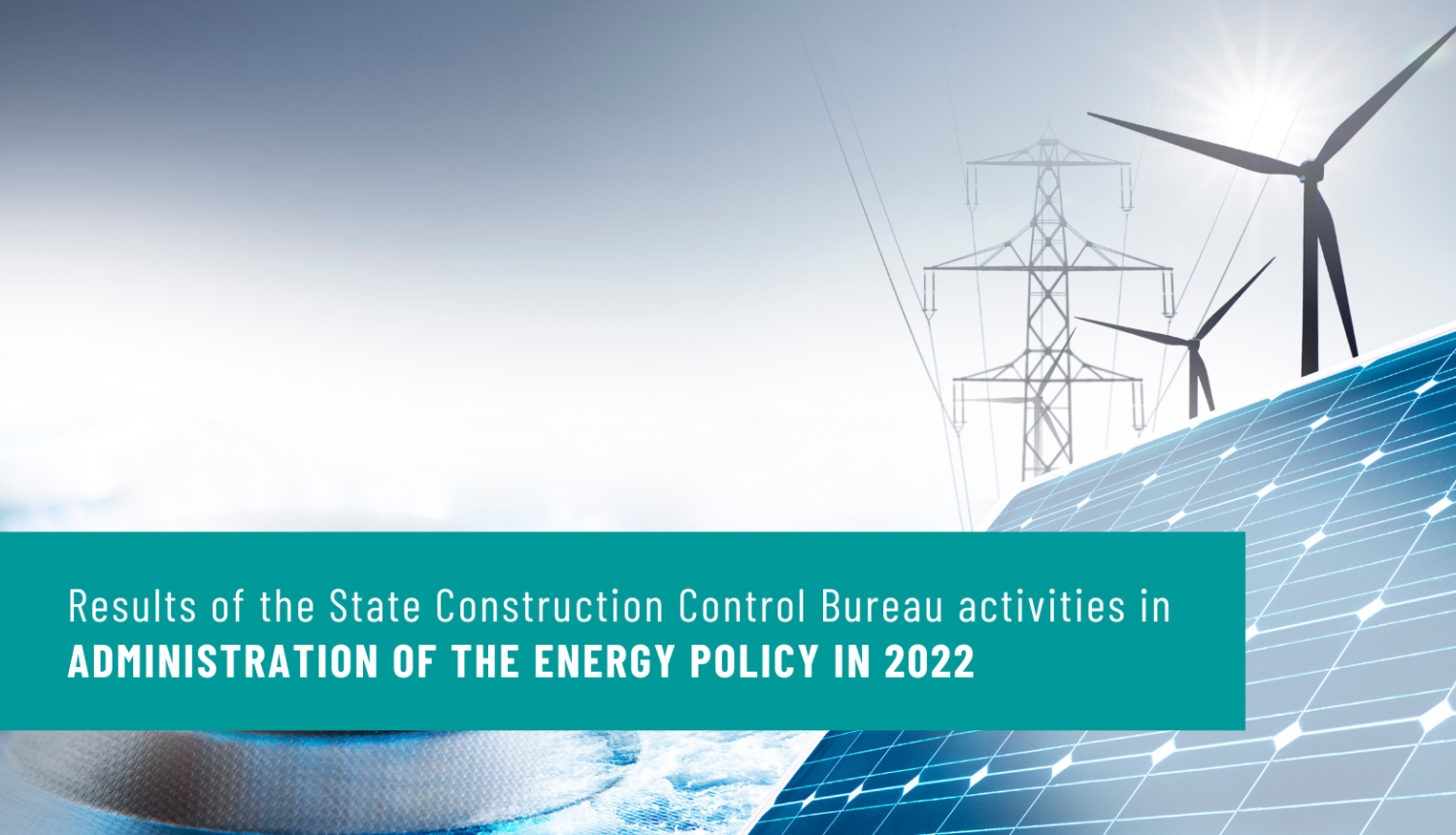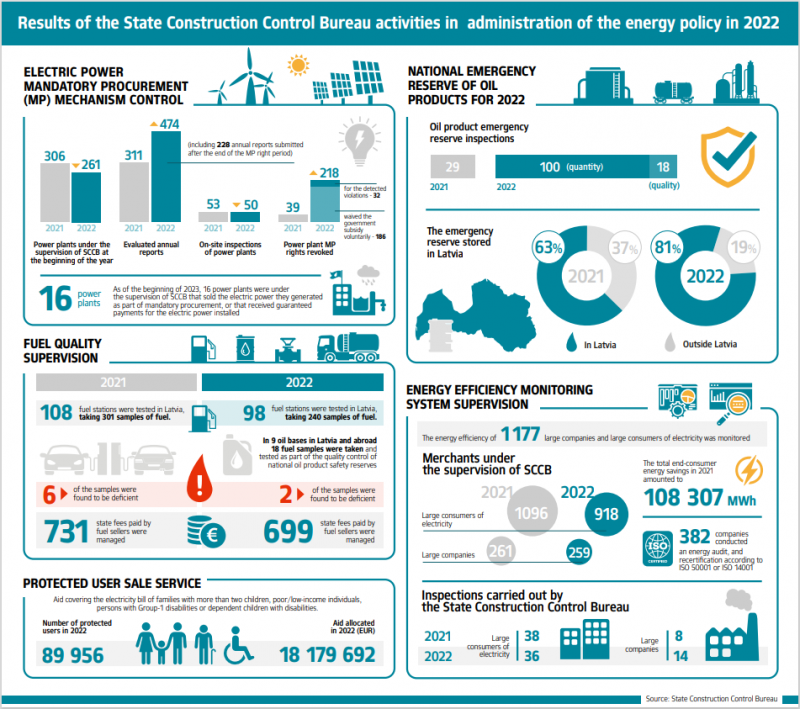Last year, the State Construction Control Bureau (SCCB) continued the active fulfilment of its energy policy function, with particular attention aimed at providing education about energy efficiency and improving the energy efficiency monitoring system. SCCB also received new functions for managing the assistance intended for households and businesses that face rising energy costs.
Mandatory electric power procurement
In 2022, the SCCB assessed the annual reports submitted by 474 power plants, including 228 annual reports submitted after the end of the period for using the right to mandatory procurement (MP). 53 on-site inspections took place at power-generating facilities that received government assistance in the form of electric power MP. With the rising energy prices and changes in legislation, the number of businesses that received government assistance in the form of electric power MP had significantly decreased. At the beginning of 2022, there were 261 power plants under the supervision of the SCCB, and during the reporting period, 218 merchants lost the right to MP, of which 186 merchants waived the government assistance themselves, the right of 32 was revoked due to breaches found, and 11 were required to repay unjustifiably or illegally received government assistance to SIA ‘Enerģijas publiskais tirgotājs’, in the total amount of EUR 1 228 789.55. On 16 February 2023, 12 power plants remained under the supervision of the SCCB.
Since 2020, merchants have been required to repay government assistance unjustifiably or illegally received amounting to a total of EUR 5 301 164.70, of which EUR 2 821 012.33 has already been recovered. The recovery continues. Some merchants have contested the decisions in court, and some of the cases have been assigned to sworn judicial enforcement agents for debt collection.
Energy efficiency
During the reporting period, the energy efficiency monitoring activity covered 1177 merchants, of which 259 were large companies and 918 were major electricity consumers. As part of the energy efficiency monitoring, 50 merchants were inspected in detail to determine compliance with their duties, assessing the implementation of the proposed potential energy saving measures as compared to the energy efficiency measures actually implemented during the previous year. During the inspections, the SCCB confirmed the implementation of the measures and discussed the potential of each merchant in terms of future improvements in energy efficiency. A comparison of the energy savings expected as part of the planned energy efficiency measures and of the savings actually achieved shows that the energy savings achieved in the inspected companies were more than 3 times higher than the originally expected ones: specifically, 161.84 GWh, as compared to the 45.67 GWh originally planned. For failing to meet the requirements of the Energy Efficiency Law, 2 decisions to charge an energy efficiency fee were issued for large companies, and 16, for large power consumers.
Given the geopolitical situation, followed by a rapid increase in energy prices, particular attention was paid to providing education about energy efficiency during the reporting period. In the second half of the year, the SCCB organised seminars for municipal governments, demonstrating the benefits of energy management and encouraging them to review their resource consumption and to make long-term decisions. Practical recommendations for increasing energy efficiency were also prepared, in conjunction with energy auditors.
‘Energy efficiency should be a part of our everyday lives. It’s not just the government and companies that should think about it and invest in it, but every one of us. By investing today, we will be able to afford more tomorrow. We need to change our habits, use the opportunities we have for increasing the energy efficiency of our buildings and for replacing energy generation equipment, choosing greener alternative solutions,’ said head of the SCCB, Svetlana Mjakuškina.
Supervision of the oil product market
In 2022, 11 companies conducted the storage of the national oil product security reserve. 81% of the reserve was stored in Latvia. As part of the SCCB reserve monitoring function, 100 quantity and 18 quality inspections took place at the storage facilities of the national oil product security reserve, both in Latvia and abroad.
In 2022, the SCCB sampled and tested the fuel sold at 98 fuel stations all over Latvia. The fuel quality situation in the country is consistently good. Out of the 240 samples tested, which included 148 samples of petrol and 92 of diesel fuel, deficiencies in fuel quality were found in only 2 cases. The results of 2022 and previous years show that the fuel available at fuel stations in Latvia is of appropriate quality.
Energy information systems
During the reporting period, the Energy Resources Information System (ERIS) developed by the SCCB began its work as part of the ERDF project ‘Digital transformation of the administrative process of the Ministry of Economics’ in order to support data-based decisions, reduce the administrative burden, and enable the transparency of processes. The system includes an energy efficiency monitoring module, which has a working environment for more than 1000 entities covered by the energy efficiency monitoring system. Since the creation of the system, more and more merchants use the opportunity to submit their data electronically to ERIS. For example, in December 2022, 71% of annual reports were submitted via ERIS. A monitoring and control module for the national oil product security reserve was developed as well, collecting information about the retail price of oil products, managing the fulfilment of the obligation to pay the state fee, and monitoring and controlling the transport energy market. Currently, active work is taking place on the development of the energy community module, in order to make it possible register the first energy communities in it as soon as this year.
Protected user service
Analysing the data available to the state, the SCCB identifies assistance recipients and provides assistance to the part of society eligible for protection (families with many children, persons with group I disabilities, families with children with disabilities, poor and low-income households) through electricity traders.
In December, the number of protected users receiving such assistance reached 89,956. In 2022, a total of EUR 18 179 692 was paid as support to protected users. Amendments in the legislation require that all electricity traders whose customers include more than 10,000 households must provide a protected-user service.
Management of energy assistance
In 2022, given the scope of the resources available to it, the SCCB was entrusted with new functions: the management of government assistance for centralised district heating supply, natural gas, and power supply services, as well as the management of assistance for energy-intensive businesses. Last year, EUR 7 766 806.94 was paid to natural gas traders as compensation for the increase in natural gas costs for households. EUR 41 557 189.79 was paid to heating supply companies as compensation for the increase in the cost of centralised district heating energy supply for households. The compensation for the price difference between the market price and the expected price ceiling for electricity was EUR 5 132 177.81. The electricity compensation for legal entities was EUR 24 397 352.19. The power system service fee for companies was reduced by a total of EUR 30 991 884.50. Last December, the SCCB issued 134 decisions on granting assistance to energy-intensive manufacturing companies, with the total value of the assistance comprising EUR 23 547 431.31.




